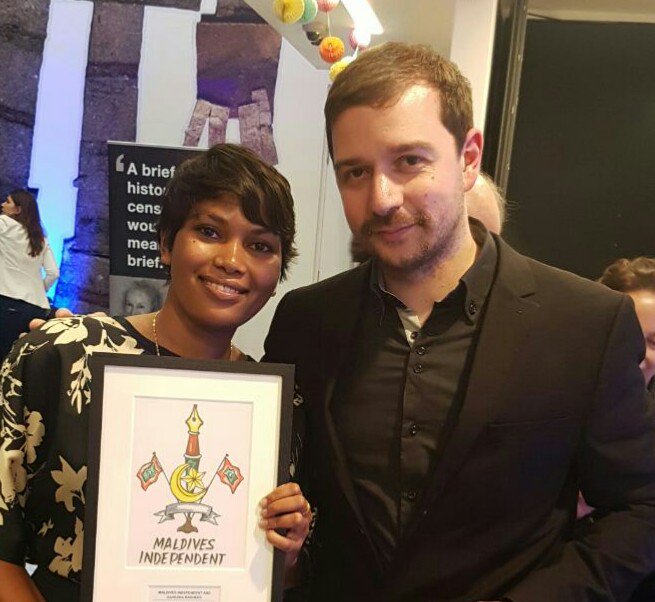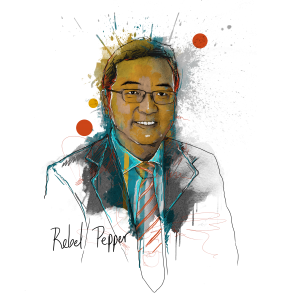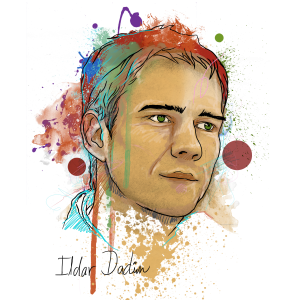21 Apr 2017 | Asia and Pacific, Digital Freedom, Europe and Central Asia, Event Reports, Maldives, News, Serbia
[vc_row][vc_column][vc_column_text]

Maldives Independent’s former editor Zaheena Rasheed and KRIK editor-in-chief Stevan Dojcinovic. (Photo: KRIK)
Thousands of miles separate the Maldives from Serbia, but Zaheena Rasheed, the Index award-winning journalist and former editor of Maldives Independent, and Stevan Dojcinovic, editor-in-chief of the Serbian investigative website KRIK, but both described similar attacks on press freedom at a panel discussion at the Corinthia Hotel in London.
Rasheed lives in exile, having been forced to flee the Indian Ocean archipelago after working on an Al Jazeera documentary critical of the Maldivian government. She said she escaped just in time – a man who left a day later “barely made it out of the airport”.
Rasheed spoke of the intimidation tactics that independent news media had been subject to in the country. “Some newsrooms had gangs going inside of the newsroom and saying specifically we are not leaving until certain articles were taken down,” she said.
The Maldivian government claims that these gangs are criminals beyond their control.
As violence does not deter outlets like Maldives Independent from their investigative work, president Abdulla Yameen’s regime resorted to legal means, including imposing a draconian defamation law.
Rasheed said: “The definition of defamation is so broad that I could be sued for something I think, it doesn’t have to even be expressed. It could be a gesture. If it’s a gang or criminals after you, you can hide and avoid it, but when it’s the government you just can’t.”
On Serbia, Dojcinovic said that most in the West do not realise the extent of the country’s problems. “There’s not a real, clear picture of Serbia in the EU regarding how wild corruption and crime are,” he said.
Both journalists have seen hard-won democratic freedoms erode quickly. In Serbia this slide began in 2012 when Aleksandar Vučić was elected prime minister (this month, Vučić was also elected as the country’s president). Dojcinovic said: “The government has managed to destroy and undermine all of the democratic institutions built over 12 years within two years. We no longer have an independent judicial system and it’s the same with the media.”
In the Maldives, 2012 also left its mark. “Since the coup, a lot of democratic gains have been lost. What we saw in the first couple of years after the coup were physical assaults against journalists,” Rasheed said. “There were murder attempts, death threats and one TV station was even torched.”
She said that police turned a blind eye to these attacks. “All of the CCTV cameras were turned away from the building. The police just weren’t there.”
Whilst the threats are different in Serbia, Dojcinovic described a choked media landscape: “It’s not possible to see criticism of the government in the mainstream media. Not on any newsstand or on any TV frequency. They have destroyed all of these institutions.”
Dojcinovic said that the Serbian government is falling into the same patterns as Slobodan Milosevic’s regime: “It’s the arrests of journalists by the same group of people who were behind the murder of journalists back in the 1990s. They can’t cross this line now because it would ruin their reputation with the EU, so they find a way to make your life a nightmare without leaving fingerprints.”
Reprisals for his work have included three smear campaigns: he has been tagged as a criminal for his links to organised crime, branded a foreign agent, and had his personal life put on display.
“You cannot fight this much either because you can only publish on the internet,” Dojcinovic said. “That’s nothing compared to the newspapers which present us in this way.”
In the Maldives, however, there appears to be no such line. Rasheed said: “A member of our team was disappeared in 2014. Then a well-known gangster, who we think was involved in our colleague’s disappearance, vandalised the security cameras [at our office] and left a machete at our door. And then I got a text message saying: ‘You’re next.’”
Rasheed thinks that her colleague Ahmed Rilwan was targeted because he was seen to be in favour of secularism, and negative stories about Islamic radicalisation raise the government’s ire. “What really bothers them are these stories of growing radicalisation in the Maldives because that is what puts tourists off,” she said.
Rasheed also spoke about the difficulties of constantly fighting such repression. She told the audience that she had, to some extent, been traumatised by her experiences. However: “As a journalist, the most important thing to do is to live to tell the story.”[/vc_column_text][/vc_column][/vc_row][vc_row][vc_column][vc_basic_grid post_type=”post” max_items=”4″ element_width=”6″ grid_id=”vc_gid:1492769899588-d49a7ccf-cd47-5″ taxonomies=”8148, 9028, 8734″][/vc_column][/vc_row]
20 Apr 2017 | Awards
[vc_row][vc_column][vc_video link=”https://www.youtube.com/watch?v=-8V1Hm2Za2w”][vc_column_text] Wang Liming, better known under the pseudonym Rebel Pepper, is one of China’s most notorious political cartoonists. For satirising Chinese Premier Xi Jinping and lampooning the ruling Communist Party, Rebel Pepper has been repeatedly persecuted. In 2014, he was forced to remain in Japan, where he was on holiday, after serious threats against him were posted on government-sanctioned forums. The Chinese state has since disconnected him from his fan base by repeatedly deleting his social media accounts, he alleges his conversations with friends and family are under state surveillance, and self-imposed exile has made him isolated, bringing significant financial struggles. Nonetheless, Rebel Pepper keeps drawing, ferociously criticising the Chinese regime.
Wang Liming, better known under the pseudonym Rebel Pepper, is one of China’s most notorious political cartoonists. For satirising Chinese Premier Xi Jinping and lampooning the ruling Communist Party, Rebel Pepper has been repeatedly persecuted. In 2014, he was forced to remain in Japan, where he was on holiday, after serious threats against him were posted on government-sanctioned forums. The Chinese state has since disconnected him from his fan base by repeatedly deleting his social media accounts, he alleges his conversations with friends and family are under state surveillance, and self-imposed exile has made him isolated, bringing significant financial struggles. Nonetheless, Rebel Pepper keeps drawing, ferociously criticising the Chinese regime.
笔名为“变态辣椒” 的王立铭是一位来自中国大陆的漫画家,以其反共讽刺性漫画而闻名。他因为讥讽习近平以及中国共产党而一而再再而三地受政府迫害。2014年5月,王立铭在旅游日本期间因在中国大陆官媒《人民网》受威胁儿被迫居留日本。中国大陆因想断绝王立铭与其粉丝的关系而删除他社交媒体的账号。他声称与亲戚朋友的交谈总是被监视。他也因为长期独自流亡国外而渐渐地与世隔绝, 陷入经济困境。然而,他并没有放弃以他讽刺性的漫画讥讽共产党。
“Since 2010, I have been adhering to the use of cartoons as a weapon against the Communist Party of China’s totalitarianism. The CPC’s blockade and crackdown on freedom of expression has never ceased. Their persecution against me has not stopped.” — Rebel Pepper[/vc_column_text][/vc_column][/vc_row][vc_row][vc_column][vc_basic_grid post_type=”post” max_items=”12″ style=”load-more” items_per_page=”4″ element_width=”6″ grid_id=”vc_gid:1501084482480-564597df-b0b6-3″ taxonomies=”9021″][awards_fellows years=”2017″][/vc_column][/vc_row]
20 Apr 2017 | Awards, Digital Freedom
[vc_row][vc_column][vc_video link=”https://www.youtube.com/watch?v=bc48C8QSOY4″][vc_column_text] A Russian opposition and LGBT rights activist, Ildar Dadin was the first, and remains the only, person to be convicted under a notorious 2014 public assembly law. Aimed at punishing anyone who breaks strict rules on protest, the law was enacted to silence dissent after a wave of demonstrations following Putin’s last election victory. Dadin’s crime was to stage a series of one-man pickets, often standing silently with a billboard, attempting to duck the cynical law and push for free expression. For his solo enterprise, Dadin was arrested and sentenced to three years imprisonment in December 2015. In November 2016, website Meduza published a letter smuggled from Dadin to his wife, exposing torture he claimed he was suffering alongside fellow prisoners. The letter, a brave move for a serving prisoner, was widely reported. A government investigation was prompted, and Dadin was transferred – against his will – to an undisclosed new location. A wave of public protest led to Dadin’s new location in a Siberian prison colony being revealed in January 2017. In February 2017, Russia’s constitutional and Supreme Courts suddenly quashed Dadin’s conviction, ruling he should be released and afforded opportunity for rehabilitation.
A Russian opposition and LGBT rights activist, Ildar Dadin was the first, and remains the only, person to be convicted under a notorious 2014 public assembly law. Aimed at punishing anyone who breaks strict rules on protest, the law was enacted to silence dissent after a wave of demonstrations following Putin’s last election victory. Dadin’s crime was to stage a series of one-man pickets, often standing silently with a billboard, attempting to duck the cynical law and push for free expression. For his solo enterprise, Dadin was arrested and sentenced to three years imprisonment in December 2015. In November 2016, website Meduza published a letter smuggled from Dadin to his wife, exposing torture he claimed he was suffering alongside fellow prisoners. The letter, a brave move for a serving prisoner, was widely reported. A government investigation was prompted, and Dadin was transferred – against his will – to an undisclosed new location. A wave of public protest led to Dadin’s new location in a Siberian prison colony being revealed in January 2017. In February 2017, Russia’s constitutional and Supreme Courts suddenly quashed Dadin’s conviction, ruling he should be released and afforded opportunity for rehabilitation.
Активист, долгое время защищавший права ЛГБТ и оппозиции, Ильдар Дадин стал первым и единственным в России осужденным по принятой в 2014 году статье «Неоднократное нарушение установленного порядка организации либо проведения собрания, митинга, демонстрации, шествия или пикетирования».
Пытаясь обойти этот закон, Дадин провел серию одиночных пикетов против нарушений прав человека, за что был арестован и в 2015 приговорен к трем годам тюрьмы. В ноябре 2016, интернет-издание «Медуза» опубликовало письмо, которое Дадин передал через свою жену. В нем он рассказал о том, как его пытали, и о повсеместности насилия в российских тюрьмах. Публикация его письма – смелый шаг для отбывающего наказание заключенного – имело широкий общественный резонанс, вызвав реакцию со стороны правительства и став основанием для расследования. Дадина, против его воли, перевели из его колонии, после чего он исчез внутри российской пенитенциарной системы. Его местонахождение было раскрыто лишь в январе 2017 после волны общественных протестов. После того как Верховный суд отменил приговор, Ильдар Дадин вышел на свободу из колонии, 26 февраля.
“Nastya, I ask you to publish this letter because there is a real ‘information blockade’ in this place. (…) I am not afraid of death. Most of all, I am afraid of not being able to withstand the torture and surrendering.” — Ildar Dadin[/vc_column_text][/vc_column][/vc_row][vc_row][vc_column][awards_fellows years=”2017″][vc_basic_grid post_type=”post” max_items=”12″ style=”load-more” items_per_page=”4″ element_width=”6″ grid_id=”vc_gid:1493892409601-d3982799-8efd-3″ taxonomies=”9013″][/vc_column][/vc_row]
20 Apr 2017 | Awards, Digital Freedom
[vc_row][vc_column][vc_video link=”https://www.youtube.com/watch?v=GPhf_u479mI”][vc_column_text] Website Maldives Independent, which provides news in English, is one of the few remaining independent media outlets in a country that ranks 112 out of 180 countries on the Reporters Without Borders Press Freedom Index. In August 2016 the Maldives passed a law criminalising defamation and empowering the state to impose heavy fines and shut down media outlets for “defamatory” content. In September, Maldives Independent’s office was violently attacked and later raided by the police, after the release of an Al Jazeera documentary exposing government corruption that contained interviews with editor Zaheena Rasheed, who had to flee for her safety. Despite the pressure, the outlet continues to hold the government to account.
Website Maldives Independent, which provides news in English, is one of the few remaining independent media outlets in a country that ranks 112 out of 180 countries on the Reporters Without Borders Press Freedom Index. In August 2016 the Maldives passed a law criminalising defamation and empowering the state to impose heavy fines and shut down media outlets for “defamatory” content. In September, Maldives Independent’s office was violently attacked and later raided by the police, after the release of an Al Jazeera documentary exposing government corruption that contained interviews with editor Zaheena Rasheed, who had to flee for her safety. Despite the pressure, the outlet continues to hold the government to account.
“Journalists in the Maldives have taken unprecedented risks in reporting on human rights, business corruption and abuse of authority. I believe a free press is crucial, essential in protecting human rights.” — Zaheena Rasheed[/vc_column_text][/vc_column][/vc_row][vc_row][vc_column][awards_fellows years=”2017″][vc_basic_grid post_type=”post” max_items=”12″ style=”load-more” items_per_page=”4″ element_width=”6″ grid_id=”vc_gid:1493892692381-e3adb733-ce94-6″ taxonomies=”9028″][/vc_column][/vc_row]


 Wang Liming, better known under the pseudonym Rebel Pepper, is one of China’s most notorious political cartoonists. For satirising Chinese Premier Xi Jinping and lampooning the ruling Communist Party, Rebel Pepper has been repeatedly persecuted. In 2014, he was forced to remain in Japan, where he was on holiday, after serious threats against him were posted on government-sanctioned forums. The Chinese state has since disconnected him from his fan base by repeatedly deleting his social media accounts, he alleges his conversations with friends and family are under state surveillance, and self-imposed exile has made him isolated, bringing significant financial struggles. Nonetheless, Rebel Pepper keeps drawing, ferociously criticising the Chinese regime.
Wang Liming, better known under the pseudonym Rebel Pepper, is one of China’s most notorious political cartoonists. For satirising Chinese Premier Xi Jinping and lampooning the ruling Communist Party, Rebel Pepper has been repeatedly persecuted. In 2014, he was forced to remain in Japan, where he was on holiday, after serious threats against him were posted on government-sanctioned forums. The Chinese state has since disconnected him from his fan base by repeatedly deleting his social media accounts, he alleges his conversations with friends and family are under state surveillance, and self-imposed exile has made him isolated, bringing significant financial struggles. Nonetheless, Rebel Pepper keeps drawing, ferociously criticising the Chinese regime. A Russian opposition and LGBT rights activist, Ildar Dadin was the first, and remains the only, person to be convicted under a notorious 2014 public assembly law. Aimed at punishing anyone who breaks strict rules on protest, the law was enacted to silence dissent after a wave of demonstrations following Putin’s last election victory. Dadin’s crime was to stage a series of one-man pickets, often standing silently with a billboard, attempting to duck the cynical law and push for free expression. For his solo enterprise, Dadin was arrested and sentenced to three years imprisonment in December 2015. In November 2016, website Meduza published a letter smuggled from Dadin to his wife, exposing torture he claimed he was suffering alongside fellow prisoners. The letter, a brave move for a serving prisoner, was widely reported. A government investigation was prompted, and Dadin was transferred – against his will – to an undisclosed new location. A wave of public protest led to Dadin’s new location in a Siberian prison colony being revealed in January 2017. In February 2017, Russia’s constitutional and Supreme Courts suddenly quashed Dadin’s conviction, ruling he should be released and afforded opportunity for rehabilitation.
A Russian opposition and LGBT rights activist, Ildar Dadin was the first, and remains the only, person to be convicted under a notorious 2014 public assembly law. Aimed at punishing anyone who breaks strict rules on protest, the law was enacted to silence dissent after a wave of demonstrations following Putin’s last election victory. Dadin’s crime was to stage a series of one-man pickets, often standing silently with a billboard, attempting to duck the cynical law and push for free expression. For his solo enterprise, Dadin was arrested and sentenced to three years imprisonment in December 2015. In November 2016, website Meduza published a letter smuggled from Dadin to his wife, exposing torture he claimed he was suffering alongside fellow prisoners. The letter, a brave move for a serving prisoner, was widely reported. A government investigation was prompted, and Dadin was transferred – against his will – to an undisclosed new location. A wave of public protest led to Dadin’s new location in a Siberian prison colony being revealed in January 2017. In February 2017, Russia’s constitutional and Supreme Courts suddenly quashed Dadin’s conviction, ruling he should be released and afforded opportunity for rehabilitation. Website Maldives Independent, which provides news in English, is one of the few remaining independent media outlets in a country that ranks 112 out of 180 countries on the Reporters Without Borders Press Freedom Index. In August 2016 the Maldives passed a law criminalising defamation and empowering the state to impose heavy fines and shut down media outlets for “defamatory” content. In September, Maldives Independent’s office was violently attacked and later raided by the police, after the release of an Al Jazeera documentary exposing government corruption that contained interviews with editor Zaheena Rasheed, who had to flee for her safety. Despite the pressure, the outlet continues to hold the government to account.
Website Maldives Independent, which provides news in English, is one of the few remaining independent media outlets in a country that ranks 112 out of 180 countries on the Reporters Without Borders Press Freedom Index. In August 2016 the Maldives passed a law criminalising defamation and empowering the state to impose heavy fines and shut down media outlets for “defamatory” content. In September, Maldives Independent’s office was violently attacked and later raided by the police, after the release of an Al Jazeera documentary exposing government corruption that contained interviews with editor Zaheena Rasheed, who had to flee for her safety. Despite the pressure, the outlet continues to hold the government to account.